BusinessEurope Headlines No. 2017-21
EU-China Business Summit: We have common interests - but rules must be respected
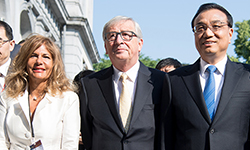 At this year's EU-China Business Summit 2017 in Brussels, leaders have expressed their strong common interests, namely to improve mutually beneficial trade relations. But the summit was also an opportunity to exchange clear words. BusinessEurope President Emma Marcegaglia stressed that rules are an important tool against market distortions. She warned that Chinese production overcapacity caused an impact on European business. China's Prime Minister Li Keqiang underlined that investment by European countries in China would continue to increase substantially despite slower growth in China, while European Commission President Jean-Claude Juncker said: "Our joint leadership provides businesses, investors and researchers – in Europe, China and around the world – with the certainty they need to build a global low-carbon economy." But he also warned: "Roughly half of EU companies say that it actually got harder last year. One in two say they feel less welcome than when they entered the Chinese market. And more than half say that foreign companies are treated unfairly compared to their Chinese competitors."
At this year's EU-China Business Summit 2017 in Brussels, leaders have expressed their strong common interests, namely to improve mutually beneficial trade relations. But the summit was also an opportunity to exchange clear words. BusinessEurope President Emma Marcegaglia stressed that rules are an important tool against market distortions. She warned that Chinese production overcapacity caused an impact on European business. China's Prime Minister Li Keqiang underlined that investment by European countries in China would continue to increase substantially despite slower growth in China, while European Commission President Jean-Claude Juncker said: "Our joint leadership provides businesses, investors and researchers – in Europe, China and around the world – with the certainty they need to build a global low-carbon economy." But he also warned: "Roughly half of EU companies say that it actually got harder last year. One in two say they feel less welcome than when they entered the Chinese market. And more than half say that foreign companies are treated unfairly compared to their Chinese competitors."
Photo copyright: European Union, 2017
Contact: Maurice Fermont
President Marcegaglia meets Commissioner Moedas
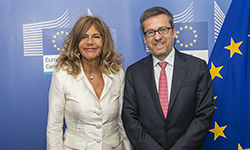 “EU industry and business strongly support the objective and architecture of Horizon 2020”, Emma Marcegaglia, President of BusinessEurope, stressed at a bilateral meeting with European Commissioner Carlos Moedas on 2 June, discussing the EU Framework Programme for Research and Innovation. “For its next period, the programme must build on its achievements, in particular the three-pillar structure covering the whole research and innovation eco-system. Companies are committed to investing in innovative projects with a clear European added value”, she added. For this to happen, keeping financial support to all-sized companies in the succeeding programme will be of utmost importance. BusinessEurope recently published a number of key recommendations for the design of the next EU research and innovation framework programme.
“EU industry and business strongly support the objective and architecture of Horizon 2020”, Emma Marcegaglia, President of BusinessEurope, stressed at a bilateral meeting with European Commissioner Carlos Moedas on 2 June, discussing the EU Framework Programme for Research and Innovation. “For its next period, the programme must build on its achievements, in particular the three-pillar structure covering the whole research and innovation eco-system. Companies are committed to investing in innovative projects with a clear European added value”, she added. For this to happen, keeping financial support to all-sized companies in the succeeding programme will be of utmost importance. BusinessEurope recently published a number of key recommendations for the design of the next EU research and innovation framework programme.
Photo copyright: European Union, 2017
![]() Contact: Alexandre Affre
Contact: Alexandre Affre
Beyrer in St. Petersburg: important to sustain dialogue with Russian partners
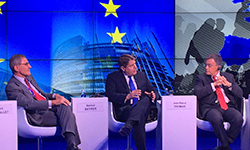 “Despite current political challenges, which we cannot overlook, the EU and Russia remain partners and should find ways to cooperate on issues of common interest”, Markus J. Beyrer, Director General of BusinessEurope, stated in the context of the St. Petersburg International Economic Forum (SPIEF) on 2 June 2017. Talking during the high-level panel “Europe in the crossroads: risks and opportunities”, Beyrer gave a positive perspective highlighting successes like long-term peace and the single market, that had a tremendously positive impact on EU citizens in the past decades. He also pointed to challenges that still lie ahead of us. To be able to cope with them, he underlined the importance of a renewed industrial policy, an effective trade policy and a strong foreign policy, particularly with countries in our neighbourhood.
“Despite current political challenges, which we cannot overlook, the EU and Russia remain partners and should find ways to cooperate on issues of common interest”, Markus J. Beyrer, Director General of BusinessEurope, stated in the context of the St. Petersburg International Economic Forum (SPIEF) on 2 June 2017. Talking during the high-level panel “Europe in the crossroads: risks and opportunities”, Beyrer gave a positive perspective highlighting successes like long-term peace and the single market, that had a tremendously positive impact on EU citizens in the past decades. He also pointed to challenges that still lie ahead of us. To be able to cope with them, he underlined the importance of a renewed industrial policy, an effective trade policy and a strong foreign policy, particularly with countries in our neighbourhood.
Contact: Sofia Bournou
Inclusiveness is key in shift to circular economy in Europe
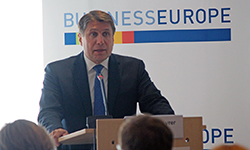 “Member States have to engage effectively with their businesses, with each other and with the EU institutions in order to make sure that circular economy is not just a Brussels discussion. Here it is vital that we understand the challenges that Member States and their businesses face”, said BusinessEurope Director General Markus J. Beyrer when launching the European Circular Economy Industry Platform to highlight these challenges as well as what SMEs, industry and other business is already doing. “Raising awareness and inclusiveness are key in making sure, Europe as a whole shifts to a circular economy and grasps its huge socio-economic potential”, he added. Other keynote speakers during BusinessEurope’s high-level event on circular economy “Engaging business and Member States” on 7 June. Other keynote speakers were Irmfried Schwimann (Deputy Director-General, DG GROW), Kęstutis Sadauskas (Director for Circular Economy and Green Growth, DG Environment) and Alexandre Affre (Director of Industrial Affairs, BusinessEurope).
“Member States have to engage effectively with their businesses, with each other and with the EU institutions in order to make sure that circular economy is not just a Brussels discussion. Here it is vital that we understand the challenges that Member States and their businesses face”, said BusinessEurope Director General Markus J. Beyrer when launching the European Circular Economy Industry Platform to highlight these challenges as well as what SMEs, industry and other business is already doing. “Raising awareness and inclusiveness are key in making sure, Europe as a whole shifts to a circular economy and grasps its huge socio-economic potential”, he added. Other keynote speakers during BusinessEurope’s high-level event on circular economy “Engaging business and Member States” on 7 June. Other keynote speakers were Irmfried Schwimann (Deputy Director-General, DG GROW), Kęstutis Sadauskas (Director for Circular Economy and Green Growth, DG Environment) and Alexandre Affre (Director of Industrial Affairs, BusinessEurope).
Pictures Brochure www.circulary.eu Full programme high-level event
Contact: Leon de Graaf
Declined SME loan applications: “Bank’s feedback should not be an obscure message”
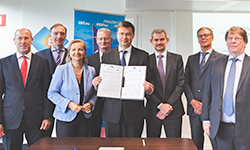 “If an SME loan application is not convincing, the bank feedback should not be an obscure message, leaving the SME without any clue about how to succeed next time,” said Daniel Cloquet, Director for Entrepreneurship and SMEs, at the ceremony where five European banking associations launched a joint initiative for improving banks’ feedback. At the ceremony held at European Banking Federation (EBF) in the presence of European Commission Vice-President Valdis Dombrovskis, the associations signed a list of high level principles for modernising the process and content of the feedback, starting with those countries which are lagging behind in this area. BusinessEurope signed the text of the principles as a sign of support to the initiative, to which it has contributed. The principles need now to be translated into national initiatives involving banking federations and SME’s representative associations.
“If an SME loan application is not convincing, the bank feedback should not be an obscure message, leaving the SME without any clue about how to succeed next time,” said Daniel Cloquet, Director for Entrepreneurship and SMEs, at the ceremony where five European banking associations launched a joint initiative for improving banks’ feedback. At the ceremony held at European Banking Federation (EBF) in the presence of European Commission Vice-President Valdis Dombrovskis, the associations signed a list of high level principles for modernising the process and content of the feedback, starting with those countries which are lagging behind in this area. BusinessEurope signed the text of the principles as a sign of support to the initiative, to which it has contributed. The principles need now to be translated into national initiatives involving banking federations and SME’s representative associations.
![]() Contact: Daniel Cloquet
Contact: Daniel Cloquet
CETA - implementation should be smooth
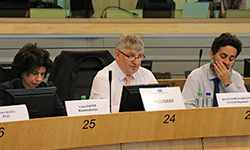 The EU-Canada Comprehensive Economic and Trade Agreement (CETA) should become a reality as soon as the process is completed on the Canadian side. Canada needs to change some of its legislation to ensure compliance with CETA. We are now waiting for Canada to pass this legislation to allow CETA to be applied provisionally. In a hearing organised in the European Economic and Social Committee, BusinessEurope highlighted the importance of having a smooth application of CETA. The agreement still needs to be ratified by the National Parliaments of the EU Member States and there is still opposition to CETA in many countries. The EU business community is looking forward to the swift implementation of CETA but we need to get it right. Any legislation adopted by Canada to fulfil its obligations under CETA must be in line with the spirit and the wording of the agreement. Therefore, the EU needs to monitor closely the process, making sure the gains obtained in CETA are not put in question in this critical phase.
The EU-Canada Comprehensive Economic and Trade Agreement (CETA) should become a reality as soon as the process is completed on the Canadian side. Canada needs to change some of its legislation to ensure compliance with CETA. We are now waiting for Canada to pass this legislation to allow CETA to be applied provisionally. In a hearing organised in the European Economic and Social Committee, BusinessEurope highlighted the importance of having a smooth application of CETA. The agreement still needs to be ratified by the National Parliaments of the EU Member States and there is still opposition to CETA in many countries. The EU business community is looking forward to the swift implementation of CETA but we need to get it right. Any legislation adopted by Canada to fulfil its obligations under CETA must be in line with the spirit and the wording of the agreement. Therefore, the EU needs to monitor closely the process, making sure the gains obtained in CETA are not put in question in this critical phase.
Contact: Luisa Santos
Public country-by-country-reporting risks undermining OECD-agreements
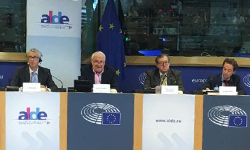 ‘Information sharing between tax authorities is the way to fight tax evasion, public country-by-country-reporting risks undermining OECD-agreements in this area’. This was the key message of James Watson, BusinessEurope’s Economics Director at a parliamentary debate on Public Country by Country Reporting, organised by the Alliance for Liberals and Democrats in Europe (ALDE). In the presence of ALDE shadow-rapporteurs on CBCR, MEP’s Enrique Calvet Chambon and Jean-Marie Cavada, James also noted that this proposal risks undermining the role of tax authorities in this area who have the expertise and information to properly enforce tax rules. Public CBCR risks putting companies with an EU presence at a competitive disadvantage and damaging the attractiveness of the EU as an investment destination.
‘Information sharing between tax authorities is the way to fight tax evasion, public country-by-country-reporting risks undermining OECD-agreements in this area’. This was the key message of James Watson, BusinessEurope’s Economics Director at a parliamentary debate on Public Country by Country Reporting, organised by the Alliance for Liberals and Democrats in Europe (ALDE). In the presence of ALDE shadow-rapporteurs on CBCR, MEP’s Enrique Calvet Chambon and Jean-Marie Cavada, James also noted that this proposal risks undermining the role of tax authorities in this area who have the expertise and information to properly enforce tax rules. Public CBCR risks putting companies with an EU presence at a competitive disadvantage and damaging the attractiveness of the EU as an investment destination.
![]()
![]() Contact: Pieter Baert
Contact: Pieter Baert
Industries and Patent Offices confirm commitment to work together
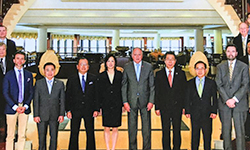 On 31 May BusinessEurope with its partners from US, Japan, Korea and China held their annual meeting with the Presidents of the Patent Offices from their regions in Malta. Industries and Patent Offices celebrated five years of cooperation, took stock of progress achieved so far and set out the next steps in their cooperation to make it fit for purpose and continuously adapting it to the needs of users. A special publication celebrating this cooperation was launched:
On 31 May BusinessEurope with its partners from US, Japan, Korea and China held their annual meeting with the Presidents of the Patent Offices from their regions in Malta. Industries and Patent Offices celebrated five years of cooperation, took stock of progress achieved so far and set out the next steps in their cooperation to make it fit for purpose and continuously adapting it to the needs of users. A special publication celebrating this cooperation was launched:
http://www.fiveipoffices.org/material/2017brochure.html
Contact: Ilias Konteas
BusinessEurope reacts to the Clean energy package
 The ‘Clean energy for all Europeans’ package is a major milestone in the debate about the future energy system in Europe. Overall, the package is a step in the right direction to adapt to new realities. Yet, some issues need to be further assessed and addressed in order to remove obstacles to a truly functioning internal power market. This includes coherence of the proposals and better assessment of positive aspects of a ‘more European’ approach – based on an integrated system and enhanced cooperation. BusinessEurope calls on policy makers to maintain the architecture agreed by European Council in 2014, to drive investments into low carbon technologies, while making sure electric power supply remains secure and affordable. BusinessEurope also stresses the role of industry in the energy transition and remains fully committed to more energy efficiency and a higher share of renewables. These measures complement the EU ETS as the key instrument to create a low-carbon economy.
The ‘Clean energy for all Europeans’ package is a major milestone in the debate about the future energy system in Europe. Overall, the package is a step in the right direction to adapt to new realities. Yet, some issues need to be further assessed and addressed in order to remove obstacles to a truly functioning internal power market. This includes coherence of the proposals and better assessment of positive aspects of a ‘more European’ approach – based on an integrated system and enhanced cooperation. BusinessEurope calls on policy makers to maintain the architecture agreed by European Council in 2014, to drive investments into low carbon technologies, while making sure electric power supply remains secure and affordable. BusinessEurope also stresses the role of industry in the energy transition and remains fully committed to more energy efficiency and a higher share of renewables. These measures complement the EU ETS as the key instrument to create a low-carbon economy.
![]() Contact: Jan Bambas
Contact: Jan Bambas
Appropriate rules on coordination of social security crucial to facilitate mobility
 Improving the coordination of social security systems by having the appropriate policies and rules in place at EU and national level is key to promote mobility within the EU and sustain its political acceptance. It is important to find the right balance between meeting the needs of those who are mobile within the EU and those who are not, as well as between countries of destination and sending countries. These are the key aims of BusinessEurope in relation to the European Commission’s proposal to revise the EU regulation 883/2004 on coordination of social security systems. Whilst some of the concrete changes proposed by the European Commission go in the right direction, we are concerned that some of the proposals on unemployment benefits and on posting of workers will not meet these aims. To strengthen the political acceptance of mobility in Member States and across the EU as a whole, the current revision should help address situations of abuse, eliminate loopholes and ensure better implementation of the rules.
Improving the coordination of social security systems by having the appropriate policies and rules in place at EU and national level is key to promote mobility within the EU and sustain its political acceptance. It is important to find the right balance between meeting the needs of those who are mobile within the EU and those who are not, as well as between countries of destination and sending countries. These are the key aims of BusinessEurope in relation to the European Commission’s proposal to revise the EU regulation 883/2004 on coordination of social security systems. Whilst some of the concrete changes proposed by the European Commission go in the right direction, we are concerned that some of the proposals on unemployment benefits and on posting of workers will not meet these aims. To strengthen the political acceptance of mobility in Member States and across the EU as a whole, the current revision should help address situations of abuse, eliminate loopholes and ensure better implementation of the rules.
Contact: Rebekah Smith
Industry and research organisations team up for next Research programme FP9
 “Strengthened European research and innovation investments, both private and public, notably in applied research, is one of the key answers to keep up with global competition and benefit the European society.” This was one of the messages voiced by BusinessEurope, European research organisations (EARTO) and a number of industrial sectors in a joint statement. In the context of the interim evaluation of the EU Framework Programme for Research and Innovation (Horizon 2020) and debate on next framework programmes (FP9), the signatories assess positively the achievements of the current framework programme, fostering research and innovation on EU level and leveraging private investments. The next EU framework programme should therefore build on Horizon 2020, in terms of the 3-pillar structure, while increasing the overall budget with equivalent share to each pillar. The statement concludes that more support to industrial activities and financial incentives to all-sized enterprises are among the key prerequisites for a successful and ambitious framework programme.
“Strengthened European research and innovation investments, both private and public, notably in applied research, is one of the key answers to keep up with global competition and benefit the European society.” This was one of the messages voiced by BusinessEurope, European research organisations (EARTO) and a number of industrial sectors in a joint statement. In the context of the interim evaluation of the EU Framework Programme for Research and Innovation (Horizon 2020) and debate on next framework programmes (FP9), the signatories assess positively the achievements of the current framework programme, fostering research and innovation on EU level and leveraging private investments. The next EU framework programme should therefore build on Horizon 2020, in terms of the 3-pillar structure, while increasing the overall budget with equivalent share to each pillar. The statement concludes that more support to industrial activities and financial incentives to all-sized enterprises are among the key prerequisites for a successful and ambitious framework programme.
![]() Contact: Jan Bambas
Contact: Jan Bambas
Investing in childcare infrastructures
 “Affordable and accessible childcare facilities are essential for parents, women and men, to better manage private and professional commitments. The infrastructures available in Europe are relatively well-developed, but more efforts are needed in many Member States to better tackle the unmet needs”, said Guillaume Cravero, BusinessEurope Senior Adviser during a panel on work-life balance, organised in the context of the European Social Fund – ESF - Transnational Platform Conference on 1 and 2 June 2017. Cravero added: “The EU and Member States should invest more where this is necessary to support the development of childcare infrastructures. One way to finance them is through public-private partnerships. Another way is using the ESF. But there we are still lacking precise data on how money is used precisely in EU Member States, at regional and local levels. We expect the European Commission and national administrations to work together to improve information gathering and evaluation of ESF use in support of childcare provision”, he added.
“Affordable and accessible childcare facilities are essential for parents, women and men, to better manage private and professional commitments. The infrastructures available in Europe are relatively well-developed, but more efforts are needed in many Member States to better tackle the unmet needs”, said Guillaume Cravero, BusinessEurope Senior Adviser during a panel on work-life balance, organised in the context of the European Social Fund – ESF - Transnational Platform Conference on 1 and 2 June 2017. Cravero added: “The EU and Member States should invest more where this is necessary to support the development of childcare infrastructures. One way to finance them is through public-private partnerships. Another way is using the ESF. But there we are still lacking precise data on how money is used precisely in EU Member States, at regional and local levels. We expect the European Commission and national administrations to work together to improve information gathering and evaluation of ESF use in support of childcare provision”, he added.
Contact: Guillaume Cravero
Calendar
 11, 18 June 2017: French legislative election
11, 18 June 2017: French legislative election- 15-16 June 2017: Digital Assembly 2017 "Digital Europe: investing in the future", Valletta
- 20 June 2017: EU Sustainable Energy Week 2017
- 20 June 2017: International forum on women and trade, Brussels